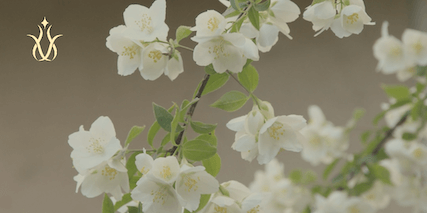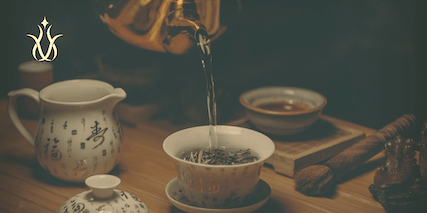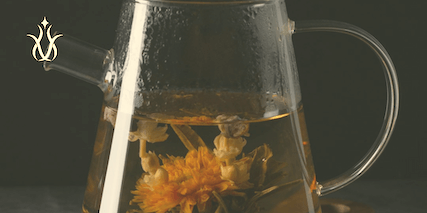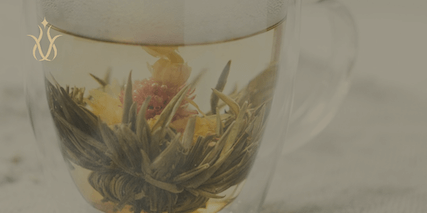Experience the healthful embrace of jasmine tea benefits — from melting away stress to fortifying your heart. This article unfurls the tapestry of wellness woven by this ancient aromatic elixir, without spoiling the depth you’ll discover in the following sections.
Key Takeaways
-
Jasmine tea, which originates from China and has a rich historical background, is traditionally based on green tea but can also include white, oolong, or black tea bases. It offers a variety of flavours and health benefits.
-
The tea contains health-promoting antioxidants like catechins and EGCG, aiding in stress and anxiety relief, immune support, ageing prevention, reduced cancer risks, and enhanced brain function and focus.
-
Jasmine tea supports cardiovascular health by reducing LDL cholesterol oxidation and plaque formation. It also aids in digestive health and weight loss by increasing metabolic rates and promoting gut health.

The Art of Jasmine Tea
Jasmine tea, steeped in Chinese history, gained prominence during the Ming and Qing dynasties. It wasn’t long before these aromatic brews crossed the seas, reaching the teapots of Western consumers by the 19th century. The crafting of jasmine tea begins with a green tea base, onto which jasmine flowers are layered to introduce their delicate aroma and subtly sweet flavour.
Creating this unique brew requires careful attention and patience. The jasmine flowers are maintained at specific temperatures of 100-104°F, and the tea leaves are infused with the scent of fresh jasmine blossoms over the course of roughly six hours. This delicate dance with nature aligns with the rhythm of the seasons, as the tea leaves are harvested from spring to late summer, and the final product graces the market in the autumn months of October or November.
The end result? A cup of jasmine tea exudes a unique blend of floral notes and subtle taste that sets it apart from other green teas. It’s not just the taste that makes it special but also the benefits of jasmine tea that extend beyond the confines of your teacup.

Types of Jasmine Tea
While green tea is traditionally used as a base for jasmine tea, it’s not limited to just that. Other tea bases such as white, oolong, and black tea can also be used, providing a variety of flavour profiles and characteristics. The scenting process deeply influences the quality of jasmine tea, where layers of tea and jasmine flowers are compressed together. Premium jasmine teas often use summer-harvested tea leaves and a meticulous scenting process with repeated replacement of the flowers to achieve a high-quality aroma.
Jasmine tea comes in various forms to cater to the preferences of tea connoisseurs. Some popular formats include:
-
Loose-leaf
-
Tea bags
-
Jasmine pearls
-
Spherical flowering teas
Each format offers a unique experience. A distinguished pure jasmine tea presents a light and clean jasmine tea taste with a soft aftertaste and fine aroma, featuring a sweet and alluring scent of jasmine flowers. High-quality jasmine green teas with a higher ratio of buds to leaves provide a nuanced and delicate flavour.
Each type of jasmine tea brings its own unique charm to the table, providing a diverse array of experiences for the consumer. But irrespective of the type, the common thread that binds them all is the health benefits that they offer.
A Natural Stress Reliever
In the hustle and bustle of our daily lives, we often yearn for a moment of calm. Jasmine tea serves as a natural stress reliever, providing a soothing escape. The scent of jasmine, akin to that of lavender, imparts a relaxing effect that calms the mind. The aroma of jasmine tea affects the nervous system positively, helping to reduce symptoms of depression, stress, and anxiety.
The magic doesn’t stop at the scent. L-theanine in jasmine tea stimulates the release of GABA in the brain, aiding in calming the nervous system. A cup of jasmine tea during the day or a few hours before bed can be especially beneficial in leveraging its sedative properties to unwind. It’s not just a tea, it’s a personal oasis of calm amid a hectic day.

Antioxidant Powerhouse
Jasmine tea is a powerhouse of antioxidants, including polyphenols and catechins. These compounds are known for their ability to protect cells from oxidative stress. These antioxidants help maintain high levels of cellular antioxidants and reduce inflammation, as suggested by animal studies. A specific catechin found in jasmine tea, known as Epigallocatechin gallate (EGCG), contributes to its potent antioxidant properties.
In addition to their general health benefits, these antioxidants also have a protective effect on cardiovascular health. They help prevent the oxidation of LDL cholesterol and reduce the risk of arterial blockages. But that’s just the tip of the iceberg. Jasmine tea’s antioxidants also offer a host of other health benefits, including:
-
Boosting the immune system
-
Improving digestion
-
Reducing stress and anxiety
-
Promoting weight loss
-
Enhancing brain function
-
Lowering the risk of certain cancers
Each of these benefits merits a closer look.
Boosts Immune System
Jasmine tea’s antioxidants, such as catechins, strengthen the immune system, providing protection against respiratory illnesses like the common cold and flu. Polyphenols in jasmine tea act as prebiotics, supporting a healthy gut microbiome, which is crucial for a robust immune system.
Moreover, a compound in jasmine tea, Epigallocatechin gallate, has been shown to block inflammation related to autoimmune conditions such as rheumatoid arthritis.
Cancer Prevention
The antioxidants in jasmine tea, including polyphenols and ECGC, have notable cancer-fighting properties. They attack the free radicals associated with cancer, and animal studies on the polyphenols in jasmine tea showed a reduction in tumour cell growth and tumour size and suppressed the spread of cancer cells.
Anti-Aging Properties
Drinking jasmine tea, which is made from green tea leaves infused with jasmine flowers, is like sipping from the fountain of youth. Its antioxidants prevent the damaging effects of free radicals, thereby slowing down the ageing process.
In addition, jasmine tea’s antioxidants and antibacterial properties promote skin health, helping it look its best.

Enhanced Mental Clarity and Focus
In need of a mental pick-me-up? Look no further than jasmine tea. Here are some benefits of jasmine tea for your brain:
-
The caffeine in jasmine tea improves focus, mental clarity, and overall brain function.
-
Unlike the jitteriness often associated with coffee, the caffeine in jasmine tea accelerates the nervous system, boosting brain power in a gentle, sustained manner.
-
The combination of caffeine and l-theanine enhances mood and alertness and sharpens focus.
Jasmine tea, specifically jasmine green tea, contains caffeine levels that closely approximate those found in green tea. This provides a sustained energy boost without the jitteriness commonly associated with coffee. So whether you’re preparing for a crucial meeting or a challenging exam, a cup of jasmine tea or jasmine milk tea can be your perfect ally.
Digestive Aid and Weight Loss Support
Jasmine tea isn’t just a delight for the senses; it’s a boon for the body too, particularly when it comes to digestion and weight loss. Jasmine tea contains catechins, which are believed to have fat-burning properties that could support weight loss. Including jasmine tea in a balanced diet and exercise routine may help enhance weight loss efforts. Regular consumption of jasmine tea can increase the metabolic rate by up to 5% and the body’s fat burning by up to 16%. Just 2-3 cups of jasmine tea daily can contribute to weight loss.
But the benefits of jasmine tea extend beyond just weight loss. It also:
-
Fights bad bacteria and supports the production of good bacteria, promoting overall gut health
-
The polyphenols in jasmine tea act as prebiotics
-
Provides high levels of cellular antioxidants
All of these benefits are beneficial for the gut microbiome and digestive health.
Moreover, jasmine tea:
-
Contains the polyphenol EGCG, which helps regulate blood sugar levels by enhancing the body’s use of insulin
-
Can help with weight loss
-
Can keep your digestive system in peak condition
So whether you’re looking to shed a few pounds or keep your digestive system in peak condition, jasmine tea is an excellent choice.
Cardiovascular Health Benefits
Jasmine tea is a heart-friendly beverage. It has a beneficial impact on heart health, including:
-
Lowering the risk of cardiovascular diseases
-
The catechins in jasmine tea help reduce LDL cholesterol oxidation
-
Preventing the formation of arterial plaques is a key factor in mitigating heart disease.
Regular consumption of jasmine tea, particularly varieties made from green tea, is associated with a decreased risk of heart attacks and strokes. So next time you reach for a refreshing drink, consider choosing to drink jasmine tea, your heart will thank you.
Active Compounds in Jasmine Tea that Contribute to its Health Benefits
The active compounds in Jasmine tea that contribute to its health benefits include a variety of natural polyphenol antioxidants and water-soluble polysaccharides. The polyphenol antioxidants mainly consist of catechins, which include (-) epicatechin (EC), (-) epicatechin gallate (ECG), (-) epigallocatechin (EGC), and (-) epigallocatechin gallate (EGCG).
These catechins have been shown to exhibit protective effects against free radical-induced lysis of red blood cells and may also have hypocholesterolemic effects.[
These antioxidants may also contribute to the hypocholesterolemic effects observed with jasmine tea consumption, as studies have shown significant serum and liver cholesterol-lowering effects, potentially due to the high levels of catechins such as (-)-epicatechin gallate and (-)-epigallocatechin gallate.
Additionally, jasmine tea has been shown to possess anti-obesity properties, as evidenced by a study where cold-brewed jasmine tea attenuated high-fat diet-induced obesity and gut microbial dysbiosis in mice. This suggests potential benefits for metabolic health and modulation of gut microbiota composition.
Furthermore, water-soluble polysaccharides extracted from jasmine tea have demonstrated in vitro antioxidant and hypoglycemic activities, which may have pharmacological implications for the use of jasmine tea in functional foods.
There is also evidence suggesting that jasmine tea may have a role in attenuating depressive-like behaviours through the gut-brain axis, potentially offering a novel approach to managing depression.
What are The Best Jasmine Tea Brands
- Twinings – A historic brand known globally for its range of teas. Twinings’ Jasmine Green Tea is popular for its balance of light, sweet jasmine and the robust flavours of green tea.
- Teapigs – Known for their commitment to quality and ethical sourcing, Teapigs offers a Jasmine Pearls tea, which features hand-rolled young green tea leaves gently infused with jasmine flowers.
- Fortnum & Mason – This luxury brand provides a premium jasmine tea experience with their Jasmine Dragon Pearls. Their tea is known for a particularly aromatic and smooth taste.
- Numi Organic Tea – Offering a range of jasmine teas, including Jasmine Green, which is made from full-leaf organic green tea scented with jasmine blossoms. Numi focuses on organic and fair-trade products.
- The Republic of Tea – This brand offers several jasmine-infused blends, including Jasmine Jazz Green Tea, which combines the lightness of green tea with the sweet fragrance of jasmine.
- Harney & Sons – This high-end tea brand offers Jasmine Flower Tea, which is a light and fragrant blend perfect for relaxation.
- Rishi Tea—Rishi Tea’s Jasmine Tea is organic and features a highly aromatic floral flavor. The company is known for its sustainable and fair-trade practices.
- Davidson’s Organics – Known for their organic teas, Davidson’s Jasmine Green Tea is prized for its delicate yet complex layers of taste.
Summary
In conclusion, the allure of jasmine tea extends beyond its captivating aroma and delicate flavour. Its rich history, diverse types, and incredible health benefits make it a truly special beverage. Whether you seek stress relief, enhanced focus, weight loss support, or cardiovascular health, jasmine tea can be a valuable addition to your daily routine.
Frequently Asked Questions
What is unique about the production of jasmine tea?
The unique aspect of jasmine tea production lies in the meticulous process of infusing tea leaves with the scent of jasmine flowers over several hours, giving the tea its distinct flavour and aroma.
How does jasmine tea help relieve stress?
Jasmine tea helps in stress relief by its calming scent and the presence of L-theanine, which helps to calm the nervous system.
What are the health benefits of jasmine tea?
Jasmine tea offers several health benefits, including antioxidants, weight loss aid, improved mental clarity, and cardiovascular advantages, along with immune system support and anti-ageing properties. These contribute to its overall positive effect on health.
Can jasmine tea help with weight loss?
Yes, jasmine tea can help with weight loss by increasing metabolic rate and fat burning due to its catechin content. Regular consumption may enhance weight loss efforts.
How does jasmine tea benefit heart health?
Regular consumption of jasmine tea is associated with a decreased risk of heart attacks and strokes due to its ability to reduce LDL cholesterol oxidation and prevent arterial plaque formation.
Disclaimer: This article is for informational purposes only and should not replace professional medical advice. If you have specific concerns or medical conditions, it is recommended to consult with a healthcare professional for personalised guidance and support.
Resources
Zhang A, Zhu QY, Luk YS, et al.
Life Sciences. 1997;61(4):383-94.
Hypocholesterolemic Effects of Chinese Tea.
Yang TT, Koo MW.
Pharmacological Research. 1997;35(6):505-12.
Cold-Brewed Jasmine Tea Attenuates High-Fat Diet-Induced Obesity and Gut Microbial Dysbiosis.
Li A, Wang J, Zhang X, et al.
Nutrients. 2022;14(24):5359. doi:10.3390/nu14245359.
Novel Antioxidant and Hypoglycemic Water-Soluble Polysaccharides From Jasmine Tea.
Tang Y, Sheng J, He X, et al.
Foods (Basel, Switzerland). 2021;10(10):2375.
Zhang Y, Huang J, Xiong Y, et al.
Nutrients. 2021;14(1):99. doi:10.3390/nu14010099.






